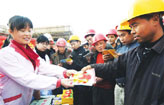Asia
Japan nuke plants ordered to beef up readiness
Updated: 2011-04-16 17:45
(Agencies)
 |
|
An anti-nuclear protester wears a pair of sunglasses with a nuclear sign during a rally in Tokyo April 16, 2011. [Photo/Agencies] |
TOKYO - An aftershock jolted Japan on Saturday hours after the country's nuclear safety agency ordered plant operators to beef up their earthquake-preparedness systems to prevent a recurrence of the nuclear crisis roiling the region north of Tokyo.
Meanwhile, the newspaper Asahi Shimbun, citing no sources, reported that a secret plan to dismantle Tokyo Electric Power Co, which runs the radiation-leaking Fukushima plant, was circulating within the government. The proposal calls for putting TEPCO, the world's largest private electricity company, under close government supervision before putting it into bankruptcy and thoroughly restructuring its assets. Most government offices were closed Saturday, and the report could not be immediately confirmed.
In the wake of the nuclear crisis, the government ordered 13 nuclear plant operators to check and improve outside power links to avoid earthquake-related outages that could cause safety systems to fail as they did at the Fukushima plant, Hidehiko Nishiyama of the Nuclear and Industrial Safety Agency told reporters late Friday. The operators, including TEPCO, were to report back by May 16.
Power outages during a strong aftershock on April 7 drove home the need to ensure that plants are able to continue to operate crucial cooling systems and other equipment despite earthquakes, tsunamis and other disasters, Nishiyama said.
Utility companies were ordered to reinforce the quake resistance of power lines connected to each reactor or to rebuild them. They also must store all electrical equipment in watertight structures. Earlier, the nuclear agency had ordered plant operators to store at least two emergency backup generators per reactor and to install fire pumps and power supply vehicles as further precautions.
The massive 46-foot (14-meter) wave that swamped Fukushima Dai-ichi last month knocked out emergency generators meant to power cooling systems. Since then, explosions, fires and other malfunctions have compounded efforts by TEPCO to repair the plant and stem radiation leaks.
Goshi Hosono, an adviser to the prime minister and member of the nuclear crisis management task force, said the damaged reactors were much more stable than they had been earlier in the crisis and TEPCO was preparing to unveil a plan for restoring cooling capacity to the ailing reactors "soon."
"Problems are still piled up and we are far from the end of crisis," he told a TV news program, citing contaminated water as one of the biggest headaches. "I expect there would be more mountains that we have to climb over."
On Saturday, TEPCO began dumping sandbags filled with zeolite, a mineral that absorbs radioactive cesium, into the sea in areas heavily contaminated with radiation in an effort to reduce damage from the leaks.
The crisis at the Fukushima plant has forced tens of thousands of people to evacuate to avoid exposure to radiation. On Friday, TEPCO announced plans for 1 million yen ($12,000) to each evacuated household in an initial round of compensation, which it expects to cost 50 billion yen ($600 million). As costs mount for the utility, TEPCO President Masataka Shimizu said the company would consider cutting executive salaries as well as a number of its more than 52,000 employees.
Radiation leaks from the crisis have contaminated crops and left fishermen in the region unable to sell their catches, adding to the suffering of communities already devastated by earthquake and tsunami damage.
E-paper

Han me downs
Traditional 3,000-year-old clothes are making a comeback.
Reaching out
Fast growth fuels rise in super rich
Chinese tourists spend more
Specials

Big spenders
More mainland tourists are expected to spend money on overseas travel this year.

Rise in super rich
Report cites rising property prices, gdp as key drivers of increasing number of chinese millionaires.

Reaching out
Condom makers are stepping up their presence in smaller cities to boost sales




